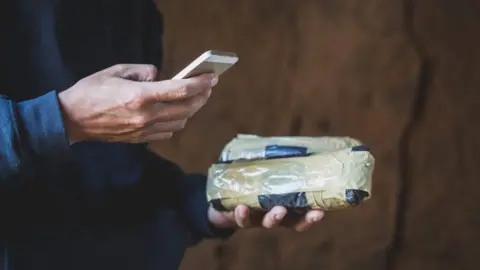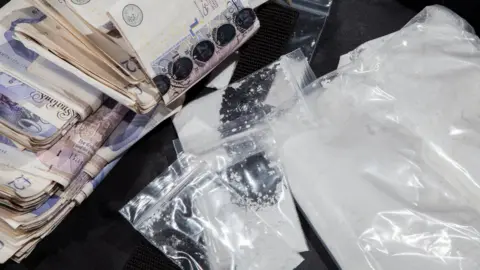County lines: Call to review 'criminal abuse' of pay-as-you-go phones
 Getty Images
Getty ImagesThe government has been urged to consider imposing restrictions on pay-as-you-go mobile phones to prevent county lines drug gangs using them.
Current rules that allow people to buy the phones anonymously are being exploited by drug dealers, the policing watchdog for England and Wales said.
It called for a Home Office review of the "criminal abuse" of mobile phones.
The Home Office said it was investing £20m to further disrupt county lines activity.
'Wider debate'
The term "county lines" is used to describe gangs and organised criminal groups distributing drugs from typically larger cities to smaller towns around the country using mobile phones to arrange deals with suppliers and buyers.
Her Majesty's Inspectorate of Constabulary and Fire and Rescue Services' report into how police forces have responded to the crime found gangs were sidestepping court orders that block phones and numbers suspected of being used for drug dealing.
There was "little support" from officers for these orders, inspectors found, because dealers can obtain replacement numbers and phones - sometimes referred to as "burners" - "quickly and anonymously".
In one instance, officers told inspectors a drug gang received and shared a new phone number within an hour of the service provider acting on an order.
Former detective Mark Powell, one of the inspectors who worked on the report, told reporters the "impression" from officers they spoke to was that restrictions on buying phones anonymously would be "welcome".
This could involve people registering personal details when buying a mobile phone or replacement SIM card, the report said.
Mr Powell said: "Officers have to resort to lengthy investigations to try to prove who had a phone.
"But clearly there's a wider debate to be had.
"We are not saying anonymity should no longer be available to everybody, but we are saying there needs to be a review of the criminal abuse of mobile phones."
He added this should look at whether regulations need "strengthening", but this was "not the end of pay-as-you-go".
Latest analysis suggests there are more than 2,000 individual deal line phone numbers in the UK, linked to around 1,000 county lines.
London, Birmingham and Liverpool are the main exporting areas, with other county lines originating from a further 23 forces, inspectors said.
Chief inspector of constabulary, Sir Thomas Winsor, said: "People regard their communications as a species of privacy that should not be intruded into.
"That's why we say the matter should be considered."


Measures enabling the courts to block individual mobile phone numbers were contained in legislation passed in 2015, when county lines were starting to spread.
It took another two years for the powers to be implemented, by which time the drug gangs had strengthened their grip.
The paperwork involved in applying for the orders was burdensome - fewer than 50 have been granted since then - and police found that when mobile numbers were shut down others were quickly in their place.
Being able to pin a particular phone number to an individual would therefore be a huge advantage for detectives - and not just those investigating drug dealing.
Virtually every criminal conspiracy and serious offence involves the use of mobiles or SIM cards, purchased anonymously.
But the ease and speed at which pay-as-you-go phones can be acquired is big business for retailers and a major attraction for customers, which is why the government is likely to proceed very cautiously before introducing any restrictions.

 Ian Dyball/Getty Creative Images
Ian Dyball/Getty Creative ImagesCounty lines gangs typically coerce children and vulnerable adults to move and store the drugs and money.
Inspectors suggested those excluded from school could be some of the most at risk of being targeted.
They also raised concerns about how those who were considered vulnerable and had been drawn into the gangs were handled by police.
A Home Office spokesman said: "We are investing £20m to further disrupt county lines activity and established the National County Lines Co-ordination Centre, which has so far resulted in more than 2,500 arrests and the safeguarding of over 3,000 vulnerable children and adults."
